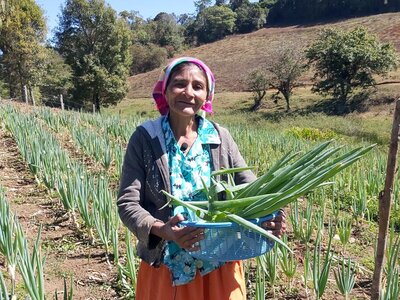Honduras
- 60%
- of the population lives in poverty
- US$618 million
- estimated annual future cost of the double burden of malnutrition
- 10.5 million
- population
Honduras is a low-middle-income country with more than 60 percent of the population living in poverty. In rural areas, one out of five Hondurans lives in extreme poverty.
Climate change, inconsistent economic growth, growing levels of inequality and poverty, violence, displacement and limited access to basic social services are some of the main factors leading to increased food insecurity and malnutrition.
Future costs of the double burden of malnutrition – the combined impact of undernutrition and overweight/obesity – are estimated at US$618 million yearly for 2018-2081, equal to 2.7 percent of annual GDP.
Honduras has made some progress towards reducing stunting, but 19 percent of children under 5 years of age still have impaired development due to malnutrition. Micronutrient deficiencies are also a serious concern, while overweight and obesity have also increased in women of reproductive age.
In 2023, Honduras faced significant challenges due to the El Niño phenomenon and a severe drought that devastated the crops of subsistence farmers. These issues were compounded by the impact of heavy rains and Tropical Storm Pilar, which disrupted efforts to build resilience.
Furthermore, the number of migrants, refugees and asylum seekers tripled this year, straining the country’s response capacities.
The World Food Programme supports government efforts to improve nutrition, enhance the resilience of smallholder farmers, and assist families affected by rapid and slow-onset disasters.
What the World Food Programme is doing in Honduras
-
Emergency preparedness and response
-
WFP continues to provide life-saving assistance and to complement the Government's response to unexpected and slow-onset disasters, by providing food assistance (cash-based transfers and in-kind) and strengthening supply chain management, emergency preparedness and response capacity. WFP helps the government to reinforce its emergency planning and preparedness capacity. WFP strengthens food logistics and coordination capacity, promoting a sustainable supply chain that will operate effectively in the aftermath of crises.
-
Resilience building
-
Through a food systems approach, WFP supports rural and urban households and communities by promoting capacity-strengthening initiatives such as training in entrepreneurship and vocational skills, especially in young people, to help diversify their income sources and acquire skills, financial services, and products they need to start and manage microbusinesses. WFP seeks to empower smallholder farmers, particularly women, and their organizations to achieve sustainable, climate-resilient livelihoods and to better manage crises, which in turn helps to discourage migration. WFP provides food and technical assistance to vulnerable urban populations. We also provide support to social protection systems and local actors, such as local governments and community-based organizations to promote employment- generation programmes and increase the incomes of vulnerable urban populations, thereby contributing to their food security and resilience to external shocks.
-
School meals
-
WFP supports the government’s national school meals programme, combining basic dry rations with complementary fresh rations that promote home-grown school feeding.
-
Nutrition
-
WFP supports the Government’s efforts to improve nutrition during the “first 1000 days” between conception and a child's second birthday, particularly through the prevention of stunting and micronutrient deficiencies. These efforts target children aged between 6 and 23 months, and pregnant and breastfeeding women and girls, including Indigenous and Afro-descendant communities. WFP assists adolescents and young people with rations, to prevent anaemia.
-
Social protection
-
WFP provides services on cash transfers, and supply chain, logistics and procurement to government agencies, humanitarian network partners and other organizations, to increase their response capacity and enable them to better cover their operational needs for the benefit of vulnerable populations.
-
Service provision
-
WFP provides services related to areas including cash transfers, logistics and procurement to government agencies, humanitarian network partners and other organizations.
Honduras news releases
Go to pagePartners and donors
Find out more about the state of food security in Honduras
Visit the food security analysis pageOperations in Honduras
Contacts
Office
Colonia Castaños Sur, Bloque 6, Casa No. 7 Paseo Virgilio Zelaya Rubí. Apartado Postal No. 17. Tegucigalpa M.D.C., Honduras
Honduras






